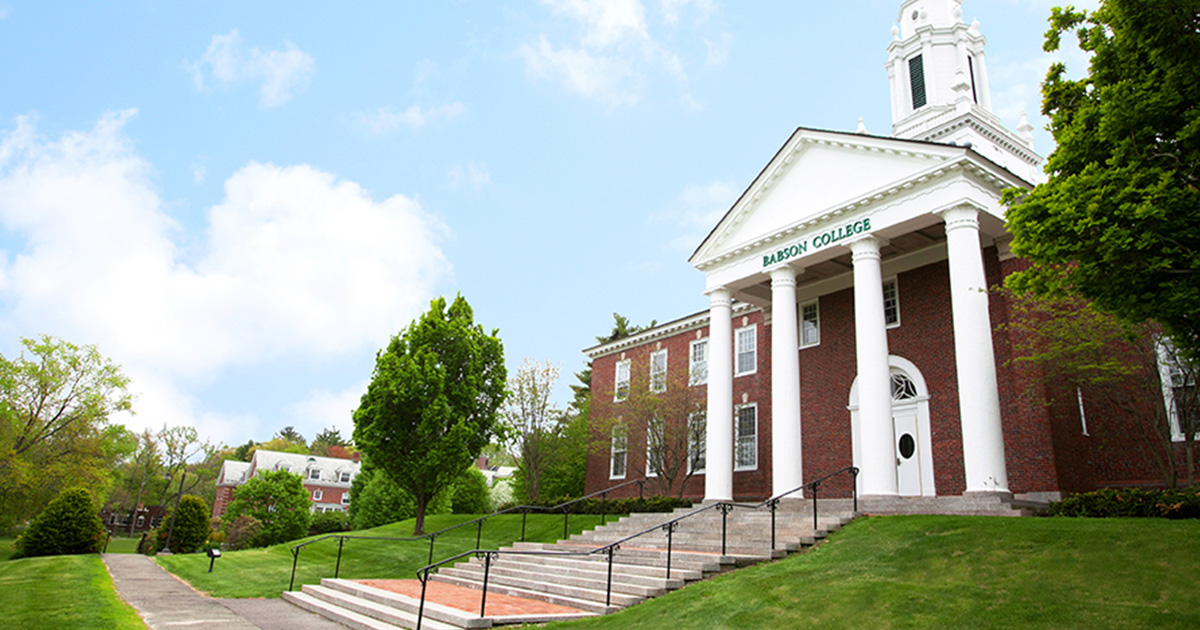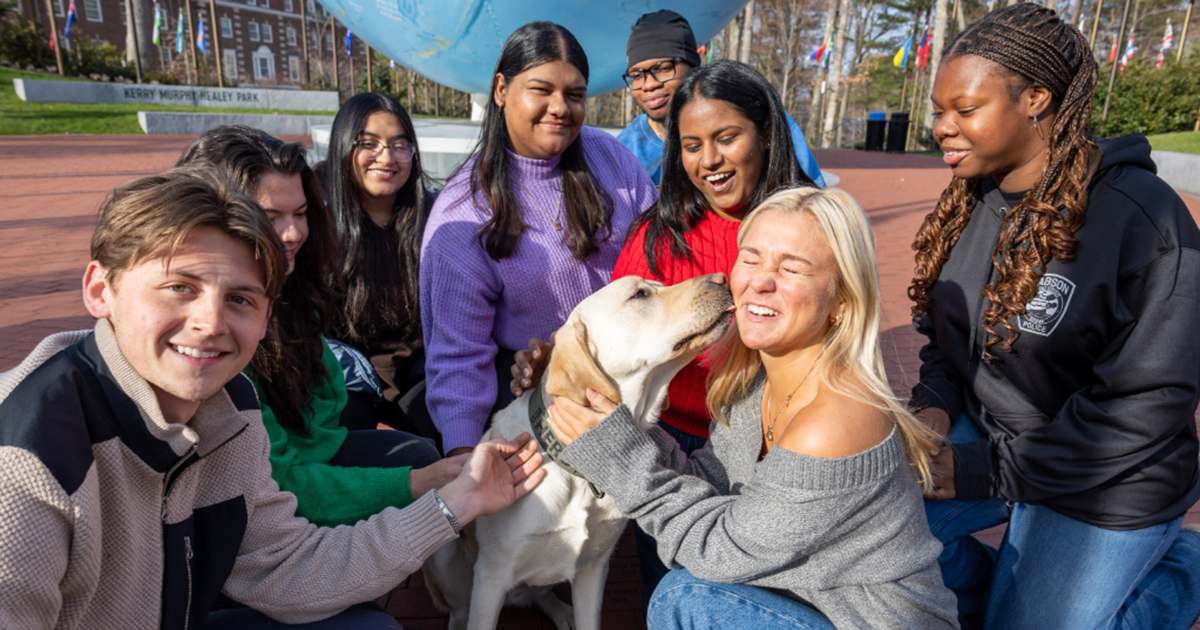Learning Together: Resuming Classes on Campus for Fall

The Babson College campus is open to all students who can safely travel to our campuses and wish to return for the academic year beginning this fall. As a community, we miss being together on our campuses and want to resume living and learning in person together. Yet, we know there’s no going back to the old normal we left behind last spring.
Learning Together will look different than it has in the past. For most students, classes will include a mix of face-to-face class time and online learning, with a smaller number of 100% online classes.
Additionally, the College has adjusted the undergraduate academic calendar so that students will not travel back to campus after Thanksgiving. Additional community safety measures are detailed in Babson Together: Returning to Campus and Our Next Normal, the College’s comprehensive plan.
Along with these changes, many things remain the same. Babson faculty will still bring their hallmark real-world knowledge and commitment to students in and out of the classroom, and you can still count on your peers for new perspectives and collaboration.
An Inside Look at the Fall 2020 Classroom Experience
Our focus from day one has been on academic continuity and the health and safety of our community. As we plan our return to campus this fall, Undergraduate and Graduate students will have two primary choices for how to take fall classes: hybrid classes and fully online classes.
“I have tremendous faith in our Babson College faculty, that they are creating innovative, extraordinary learning opportunities,” says Vice President of Academic Affairs and Dean of the College Ken Matsuno.
“I am proud of how our students and faculty responded when we were all thrust into emergency remote teaching and learning last spring, and we learned a great deal from that experience. Our Fall classes are more than just an attempt to host a traditional in-person lecture online; instead we have reimagined our courses to capture the full potential of the technology.”
“I have tremendous faith in our Babson College faculty, that they are creating innovative, extraordinary learning opportunities.”
Ken Matsuno, Vice President of Academic Affairs and Dean of the College
Hybrid Classes
Hybrid classes blend face-to-face, in-person instruction with technology so that we abide by de-densification requirements and can meet the needs of students participating remotely. These classes are designed to maximize your in-person experience in creative ways that still allow for proper social distance at all times.
Throughout the semester, faculty may use different delivery strategies at different times. The majority of Fall 2020 courses will be available in this hybrid format and can be attended virtually, which makes them accessible to all students, regardless of whether you can get to campus.
Here are a few examples of hybrid courses planned for the Fall:
Foundations of Management and Entrepreneurship (FME)
FME remains a cornerstone of the Babson College first-year experience. FME will be accessible for all first-year students, no matter if they’re studying on campus or remotely from home. It has been enhanced to include online collaborative teams and an online business development component. These skills are ones employers value more than ever, as more and more teams and companies are collaborating online, innovating long distance, and doing business virtually.
Socioecological Systems – Feeding the Modern United States
Professor Marjorie Feld and Assistant Professor David Blodgett have been meeting outdoors in each other’s driveways to develop this new course. Expect the class to include videos, podcasts, guest lectures, documentaries, and readings to review before classes begin. No matter which continent you’re learning from, this class will feature vigorous discussions about how food systems affect all of us. Small group sessions, virtual office hours, and even video tours of your professors’ gardens will be part of the learning experience.
Mysteries, Puzzles, and Wicked Problems
Associate Professor Guarab Bhardwaj teaches this intimate, workshop-style, Graduate-level course with small groups receiving personalized faculty attention. Guest speakers from around the world will join the class online for live cases – something that would not have been possible in a strictly on-campus setting. Group discussion and collaborative projects will help students learn how to work well in teams online, and how to get work done despite not being in person with your peers.
Entrepreneurial Finance
A hybrid, online and blended approach works beautifully for this class. When Adjunct Lecturer Angelo Santinelli introduces term sheets in early-stage financings, students review the terms and concepts on their own through readings and short 6- to 10-minute pre-recorded lectures. Class time features mini assignments that involve everyone, those participating online and students physically in the classroom. Then, students put what they have learned to the test in a real-time negotiation between entrepreneurs and venture capitalists. The class debriefs the negotiation after and discusses different paths the parties could have taken.
Money, Banking, and the Economy
This course from Assistant Professor Josh Staveley-O’Carroll brings together online and small group modes of hybrid learning. Students complete readings and watch short lecture videos on their own time. The night before their face-to-face small group class, students submit a quiz and provide input on the most important and most confusing topics, which then informs the discussion in small groups of 10-20 students.
M&A for Entrepreneurs
This hybrid Graduate School elective is taught by Adjunct Lecturer John Hallal, and takes a strategic view of how to evaluate all phases of the acquisition process: acquisition planning and targeting, valuation alternatives, leveraged buyouts, ESOPs/partnerships, financing buyouts, tax, legal, and accounting issues, letters of intent, due diligence, negotiating an agreement, international markets, lessons to be learned from failed acquisitions, and how to manage the leveraged company.
100% Online Classes
Fully online classes are engaging, dynamic course options that are designed to take full advantage of technology capabilities in order to serve students who need the flexibility online instruction provides. Online courses are scheduled to begin from 8 a.m. to 8 p.m. EST throughout the day, in an effort to provide options for students studying in different time zones.
Here are a few examples of 100% online course offerings planned for the Fall:
Developing the Employee Experience
Assistant Professor Kerry Gibson has re-created this course to be fully online, with a specific focus on building community among undergraduate students. The class now includes online community circle sessions; a space where students can engage with challenging issues and learn from one another in new and powerful ways. Students will have choices in terms of which assignments align with their own interests and future career plans.
Future Trends
This popular Graduate School elective taught by Senior Lecturer Caroline Daniels includes a three-hour climate simulation. Students are challenged to create scenarios to take action with energy sources, transport, buildings and industry, economic and population growth, land and industry emissions, and carbon removal. The goal? Limit the rise in global temperature to 1.5 degrees Celsius by 2100, as stated in the Paris Climate Agreement/UN Climate Change.
Economic and Political Integration in the European Union
Students in Professor Neal Harris’ online class adopt an EU member state for the duration of the semester, and post weekly audio or written blog posts about their research on the social, political, and economic issues of that state within the overall structure of the EU. Using Voice Thread, a collaboration and sharing tool, students create high-quality multimedia presentations about the current events that touch their lives throughout the semester.
Investing in the Learning Experience
In spring 2020, faculty and students undertook a herculean task of shifting 650 in-person classes online over spring break. This emergency remote teaching scenario helped us understand both what worked well, and also where there was room for improvement.
The College has made a multi-million dollar investment in faculty development, hardware, and software that will improve the learning experience. Babson faculty are participating in an intensive online teaching program, using this time to reimagine courses to be more accessible, creative, and innovative. Additionally, first-year students will have an extensive orientation and cocurricular activities to meet, bond, and learn together with classmates.
Building on Babson’s nearly 20-year history of successful distance learning and innovative curriculum development, the Fall 2020 course catalog has been intentionally redesigned with a focus on successful online and hybrid instruction.
Classrooms are equipped with advanced microphones and cameras that automatically pivot to, and zoom in on, the person speaking for a more seamless class discussion no matter whether you’re in the room or online. Each Babson class is hosted on our learning management system Canvas, for easy access to discussion boards, assignments, and class collaboration spaces.
Posted in Community






